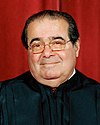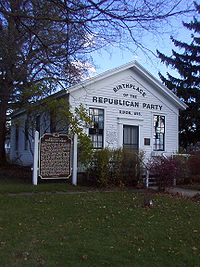Portal:Conservatism
| Main page | Showcase | Project |
Introduction
Conservatism is a cultural, social, and political philosophy and ideology, which seeks to promote and preserve traditional institutions, customs, and values. The central tenets of conservatism may vary in relation to the culture and civilization in which it appears. In Western culture, depending on the particular nation, conservatives seek to promote a range of institutions, such as the nuclear family, organized religion, the military, the nation-state, property rights, rule of law, aristocracy, and monarchy. Conservatives tend to favour institutions and practices that enhance social order and historical continuity.
Edmund Burke, an 18th-century Anglo-Irish statesman who opposed the French Revolution but supported the American Revolution, is credited as one of the forefathers of conservative thought in the 1790s along with Savoyard statesman Joseph de Maistre. The first established use of the term in a political context originated in 1818 with François-René de Chateaubriand during the period of Bourbon Restoration that sought to roll back the policies of the French Revolution and establish social order.
Conservatism has varied considerably as it has adapted itself to existing traditions and national cultures. Thus, conservatives from different parts of the world, each upholding their respective traditions, may disagree on a wide range of issues. Historically associated with right-wing politics, the term has been used to describe a wide range of views. Conservatism may be either libertarian or authoritarian, populist or elitist, progressive or reactionary, moderate or extreme. (Full article...)
Selected article
In his quarter-century on the Supreme Court, Scalia had staked out a conservative ideology in his opinions, advocating textualism in statutory interpretation and originalism in constitutional interpretation. He was a strong defender of the powers of the executive branch, believing presidential power should be paramount in many areas. He opposed affirmative action and other policies that treat minorities as groups. He filed separate opinions in large numbers of cases, and, in his minority opinions, often castigated the Court's majority in scathing language.
Selected quote
Therefore I trace the peculiar unity of the everyday political philosophy of the nineteenth century to the success with which it harmonised diversified and warring schools and united all good things to a single end. Hume and Paley, Burke and Rousseau, Godwin and Malthus, Cobbett and Huskisson, Bentham and Coleridge, Darwin and the Bishop of Oxford, were all, it was discovered, preaching practically the same thing - individualism and laissez-faire. This was the Church of England and those her apostles, whilst the company of the economists were there to prove that the least deviation into impiety involved financial ruin.
These reasons and this atmosphere are the explanations, we know it or not - and most of us in these degenerate days are largely ignorant in the matter - why we feel such a strong bias in favour of laissez-faire, and why state action to regulate the value of money, or the course of investment, or the population, provokes such passionate suspicions in many upright breasts. We have not read these authors; we should consider their arguments preposterous if they were to fall into our hands. Nevertheless we should not, I fancy, think as we do, if Hobbes, Locke, Hume, Rousseau, Paley, Adam Smith, Bentham, and Miss Martineau had not thought and written as they did. A study of the history of opinion is a necessary preliminary to the emancipation of the mind. I do not know which makes a man more conservative - to know nothing but the present, or nothing but the past.
— John Maynard Keynes, The End of Laissez-Faire (1926)
Selected image
In the United States, the Republican Party emerged in 1854, growing out of a coalition of anti-slavery Whigs and Free Soil Democrats who mobilized in opposition to Stephen A. Douglas's January 1854 introduction of the Kansas–Nebraska Act into Congress, a bill which repealed the 1820 Missouri Compromise prohibition on slavery in territory north of the 36° 30′ latitude line, and so was denounced as an aggressive expansionist pro-slavery maneuver by free soil and anti-slavery Northerners.
Two small cities of the Yankee diaspora, Ripon, Wisconsin and Jackson, Michigan, claim to be the birthplace of the Republican Party (in other words, meetings held there were some of the first 1854 anti-Nebraska assemblies to call themselves "Republican"). Ripon held the first county convention on March 20, 1854. Jackson held the first statewide convention on July 6, 1854; it declared their new party opposed to the expansion of slavery into new territories and selected a state-wide slate of candidates.
Credit: Lecter
Did you know...
- ... that California began celebrating Ronald Reagan Day on February 6, 2011, which would have been Reagan's 100th birthday?
- ...that the Minute Women of the U.S.A. was a militantly anti-communist organization for American housewives in the 1950s?
- ... that Jens Wisløff, a Norway Conservative Party politician, was called "the grand old man of asphalt"?
Selected anniversaries in May
- 1979 – Margaret Thatcher becomes the first female Prime Minister of the United Kingdom.
- 1940 – the Norway Debate in the British House of Commons begins, and leads to the replacement of Prime Minister Neville Chamberlain with Winston Churchill three days later.
- 1988 – Section 28 is enacted in Great Britain with the effect of prohibiting the promotion of homosexuality by local authorities.
Topics
Associated Wikimedia
The following Wikimedia Foundation sister projects provide more on this subject:
-
Commons
Free media repository -
Wikibooks
Free textbooks and manuals -
Wikidata
Free knowledge base -
Wikinews
Free-content news -
Wikiquote
Collection of quotations -
Wikisource
Free-content library -
Wikiversity
Free learning tools -
Wiktionary
Dictionary and thesaurus










